
magnolia-buildings
.pdf
Sprot, the old caretaker, hearing; all that noise, got frightened and went about saying that real trouble might come out of all that.
The wives flew to their husbands, but the husbands did not want to do anything. They knew that they had to live next door to x the other boys' fathers, to pass them often in the yard, and to meet them at the "Cock". "It's not my business," every man said to his wife. Only Ginger's father, who had red hair and a quick temper, made a fuss and wrote a letter to his Member of Parliament, saying that a question should be asked in the House 2 about such gang fights.
. Shorty, Thompson and George had to appear in court, as they were the ones 3 the police had managed to catch. But as it was their first official offence, they were only fined a few shillings and told to behave well4 in the future. All three boys returned to the flats, happy at having got off so lightly.5 Time passed and soon the event was forgotten.
So the two gangs remained and their fight went on.
Chapter XIII
SUMMER
It was a hot day when Mum came back from the hospital. There was an early heat wave that year. Mum still looked pale and weak but she smiled when she saw that
the flat was clean and tidy. |
|
|
|
||
"You've |
done grand," 6 |
cried |
Mum |
with |
enthusiasm, |
as she stood |
panting by the |
door, |
for it |
had |
been difficult |

for her to climb up the four flights of stairs. "Why, you've even got some flowers and the table is laid for tea!"
Ally blushed. She felt like a soldier who had polished up everything for the general's inspection, but who didn't do much on ordinary days. Still, she had done her best during these last days and she had cooked proper meals for the family.
Len came running in with a little puppy that he had found in the street. He had run all the way home, because he was afraid of old Sprot, the caretaker, who never allowed anybody to bring stray animals to the flats. He now put the puppy down and threw himself into Mum's arms. He was so happy to see her,
"You've been a good boy, Len?" asked Mum, kissing him. "Look here, duck,1 you can't keep a dog here."
"Oh, Mum, I've got to. He's quite alone in the world." "But Mr Sprot will not allow it. You know that, Len ...
Ally, dear, let's have our tea." And Mum sank into the armchair. She felt exhausted.
"But, Mum," argued Len, "if we throw the puppy out, he'll die!"
"Shut up, Len!" cried Ally. "Can't you see Mum's tired? Here is your tea, Mum, good and strong and lots of sugar."
Val rushed in looking quite as black as usual, but Mum was so happy to see him that she didn't say a word about his dirty face and missing buttons. Doreen arrived with a pile of books, said "Hello, Mum," as if her mother had just been out for the day,2 and after having her tea, began doing her homework as usual. Dad came back, and said, "How are you, Marge? O. K? That's good," and went to the kitchen to wash. But he looked very glad, for he hated the flat without Mum. It was so dull.
Auntie Glad came home later. Cold or hot weather, she wore her usual dark coat and dark cap. She whispered something, sat down to her tea and said nothing as usual. But that didn't matter, because as soon as Mum had had two or three cups of tea, she began talking. She told everything about the hospital, the doctors, the food, and the
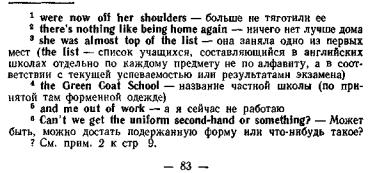
ride back. Ally sat feeling quite happy. The hard duties were now off her shoulders.1 She turned on the T. V. and sat down to watch. It was a ballet performance and all the Berners had glamour for half an hour.
"There's |
nothing like being home again," 2 said Mum |
as she sat |
beside Dad on the sofa with Len between |
them. |
|
Somehow, everyone had always felt that Doreen would get her scholarship, except Doreen herself. But then the news came that she had passed her exams so well that she was almost top of the list.3 So she got a place at the Green Coat School,4 one of the principal girls' schools of London. If Doreen worked hard, she would now certainly have a chance of going to the University.
"Yes, but what about clothes — and me out of work?" 5 asked Mum.
"I've got to go to the Green Coats," protested Doreen, very pale and excited. She certainly couldn't give up her victory now, just because of some silly clothes. "I must go now that I've won it. Can't we get the uniform secondhand or something?" 8
"Perhaps the Governmental help," said Dad. "They ought to do it. Just think of the tax we pay on beer and tobacco. Cheer up, Dor. We'll get you the clothes."
"That's right," said Mum. "We'll fix it up somehow. Just imagine! Our girl at the Green Coats! I must run along and tell Mrs Doherty and Mrs Crawley. Won't they be surprised! When Brian got into the Grammar School,7 Mrs Doherty kept talking about it day and night. But this is the Green Coats! You've done very well, Dor!"
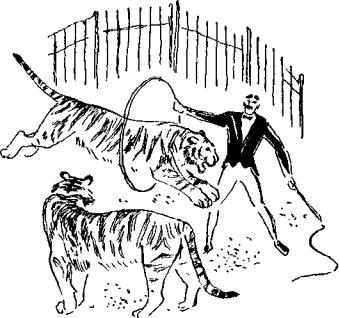
It was a very hot summer, and the people of the flats tried to spend all their free time in the open air.
The prams stood under the trees almost all day long. Once a week the band played on its stand, and sometimes there were concerts as well. The circus came as usual, and people had to queue up for the tickets. Val and his gang of course managed to get enough pennies to sit in the cheap seats. They enjoyed the show from beginning to end. They felt they had never seen such clowns, such elephants, such tigers, although it was all just the same as last year. For the next week they played circus in the yard, until old Sprot drove them away.
Ally went to the circus with Lou and she sat and saw only glamour; glamour in the fine ladies who rode on.elephants, glamour in the acrobats who threw each-other about so easily, glamour in the young men who rode bicycles high in the air. The music, the lights and colours made her drunk with excitement.
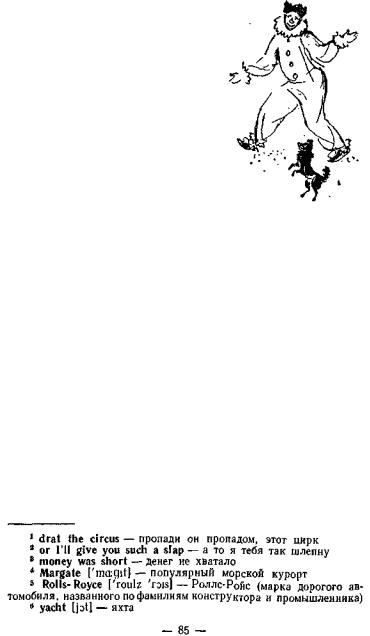
Len went on whining to see the circus, until Mum sent him there with Doreen; but he was so worried about the poor tigers who had to sit on chairs that he couldn't sleep all night.
"Drat the circus," * said Mum. "This is the last time you go, Len Berners. Those tigers are all asleep now, curled up happy as cats. And you go to sleep too or I'll give you such a slap." 2
By July, all the talk was of holidays. Everybody everywhere asked everybody else, "Where are you going for your holi-
days?" Some people had had their holidays already and went about looking like Red Indians, showing everyone their snapshots. Only the Berners family didn't talk about holidays, because they all knew they would not be able to go away that year. Money was short,3 and then some extra money would be needed to buy clothes for Doreen.
"We'll go to the country |
for a day when Dad gets |
his holiday," said Mum to cheer up the children. |
|
It was almost the end of the term and it was terribly hot |
|
in the classrooms. Ally kept |
thinking about the sea and |
the sand and the sun. Oh, to lie in the sun on the beach! Even Miss Fleetwood's pretty voice couldn't hold Ally's attention. Miss Fleetwood was going home to the country with her young man. Lou was going to Margate.4 Only Ally Berners had to stay in the hot, dusty town. It was not fair. She had worked so hard all the spring. She was
tired. She |
ought to have a holiday. In a magazine |
story |
|
a mysterious stranger would approach her |
in the |
street |
|
and say, |
"Are you Gloria Berners? The |
Rolls-Royce5 |
|
is waiting for you to take, you to the yacht.6 |
Do not worry |
||
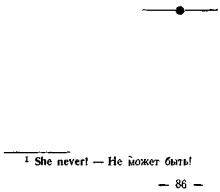
about clothes. There are lots of elegant clothes waiting for you there."
One day when she had climbed up the stairs feeling hot and tired she found her family in a state oi excitement. They were all laughing and shouting at once:
"Auntie Glad! Lottery! Holiday! Sea!" "What?" Ally shouted back.
"Be quiet all of you," cried Mum, her black eyes shining. "Auntie Glad has won two hundred and fifty pounds with her lottery ticket."
"She never!"1
"And she's taking us all to the sea. She's already booked a little summer cottage for a fortnight, when Dad has his holiday. Never told anybody anything. Just went and did it."
Then all the family began to shout again, while Ally asked all sorts of questions, and Auntie Glad sat there smiling a little, but quiet and silent as usual.
"Eight pounds a week for the cottage," said Mum. "But she says it's got a kitchen and there's a shop and all, and a cafe too, right in the camp." "
After that, the whole world changed for the Berners children. They too could go round and talk about their holiday that was even more romantic than other people's because of the lottery. Every day, when she woke up, Ally thought, "Only ten days more, only eight, only five..." Until it was only one, and everything was packed and ready to start.
Chapter XIV
THE HOLIDAY
It wasn't a very long journey, and the railway station was not far from their cottage, so they just walked along the path that led to the camp. Dad went first with the heaviest suitcase, and the others followed him, each carrying something. There had been no need to bring food as it could be bought at the camp shop.
"WELL, isn't it grand!" cried Mum as she looked at the large

field dotted with rather old little cottages. They went straight to the office which was in a wagon, to get the key of their cottage.
When they reached it, there was great excitement. The key of the door would not turn,1 because Mum's fingers trembled so.
"Give it to me," cried Dad. "There! It's easy."
They all rushed in to look at the three bedrooms, the living room, the little kitchen, the toilet, everybody talking and exclaiming at once. "Can we sleep here, Mum?" "What a small kitchen! It's worse than ours." "These beds are O. K." "Mum, can I have a drink of water?" "Mum, can we go to the beach?"
While all the rest of his family were discussing the cottage, Val did not waste time on unpacking. All he wanted was to get to the sea, the sea he had not seen for three years. He quickly ran across the field, reached the sea and looked at it with delight. That was what he wanted ...
water, light, air and space. He stood for a second breathing in the sea wind, then he threw off his shoes and socks and ran on, feeling the wet sand under his feet. There were no more streets, no more Shorty, no more cops or school. The only thing in the world was that line of pale water far, far ahead. The sea was calm. He went into it knee deep,2 rolling up his trousers, with no thought of his new shoes left on the shore. He put his hand in the water and then licked his fingers to taste the salt. The sea was all around him and everything was quiet. He was quite alone, but not at all frightened. To be alone there was a pleasure and a rest. He just stood there for a long time, feeling the last rays of sun on his head, and he licked his salty lips. He was in the sea at last!
When he came out, he felt hungry and went back to look for his shoes. It took some time s to find them, and he was afraid they had been stolen, but at last he saw them in the sand. In his wet trousers, he started back for home. On his way he met a fat, smiling little man.
"Enjoyed the sea, son?" asked the man, beaming all over his face.4 Val thought him quite old, no less than

forty, but the man looked so good-natured and friendly that Val stopped to answer.
"It's smashing," he said.
"It's a nice place," said the fat little man. "You got a cottage?"
"That's right." Val did not wish to stay and talk as he wanted to have'-his tea. "Number fifteen we've got. Just come today."
"There,1 isn't that nice?" The little man beamed all over his face again. "Me 2 and my sister have got number fourteen. Our name is Truby. Are you a big family?"
Since he was a baby Val had learnt not to give his name to strangers, but he answered, "Seven, if you count Mum and Dad and Auntie Glad."
"And how will you all fit into that cottage?" asked the little man with friendly curiosity.
"I don't know," said Val. "Haven't been inside yet." As they walked towards the cottage, they saw that all the Berners family was busy moving in.3 Mum had opened the windows. Dad was putting two deckchairs on the little verandah. Doreen was running back from the camp shop with a basket of food. As they came nearer, Val could hear Mum's excited voice, "Put it therel Be quick! Move yourself. Ally, pass me that." Inside the house, Ally was singing at the top of her voice.4 Len rushed out yelling,
"I want to go to the beach!"
"What a nice family!" sighed Mr Truby. "I'm glad you are next door to us." 5 He was going to say more, but at that moment an angry voice shouted, "William! Come in at once. Your tea's been ready for half an hour." A thin, elderly woman came out of number fourteen. She had a face like a lemon, and it was clear that she had a very bad temper.
"Oh, dear," exclaimed little Mr Truby. "I must run!" And he hurried across the grass as fast as he could on his short legs. As soon as he reached the house, his sister began to shout again, "Where've you been? I've got a terrible
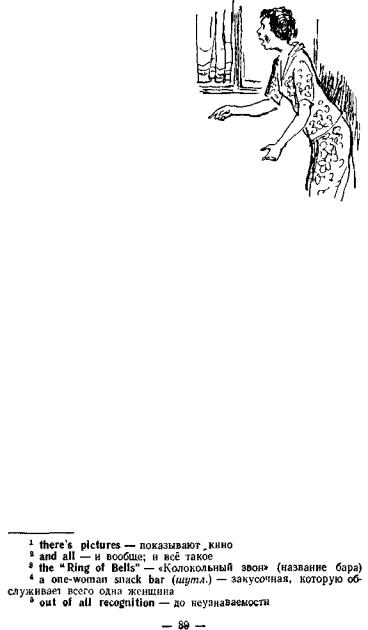
headache. Those awful people who've just moved in are making such a noise. I'll complain to the —" and she banged the door behind her brother.
The Berners had a splendid meal of sausages and chips, bread and jam and hot, strong tea. Everybody was already full of news and discoveries.
"There's picturesa on Thursday evenings at the cafe," Doreen said. "And a festival in town, on Friday
evening. And, Mum, could I buy a bathing cap? They've got lovely ones at the shop."
Ally said, "I've met an awfully nice girl, Mum. She's called Audrey. She says her Mum says I can go and look at their cottage. Oh, Mum, Audrey's got such a wonderful bathing-suit and all." 2
A man had told Dad that the nearest pub was the "Ring of Bells",3 a nice little place a quarter of a mile from the camp. He and Dad had agreed to meet there at six-thirty.
Soon the family got to know the place very well. The weather was fine and warm, and the children spent nearly all day in the sea, while Mum sat happily on the sand, giving her feet a rest. But all the time she was busy giving out buns and sandwiches and sweets and drinks as if she were a one-woman snack bar.4 All the family became fiery red, and poor Doreen, who had a fair skin, could not sleep at night.
However, in a few days, everybody became quite brown. Dad lay in the sun and went to sleep beneath his paper, and in the evenings joined the other men at the "Ring of Bells". Len changed out of all recognition 6 after a few
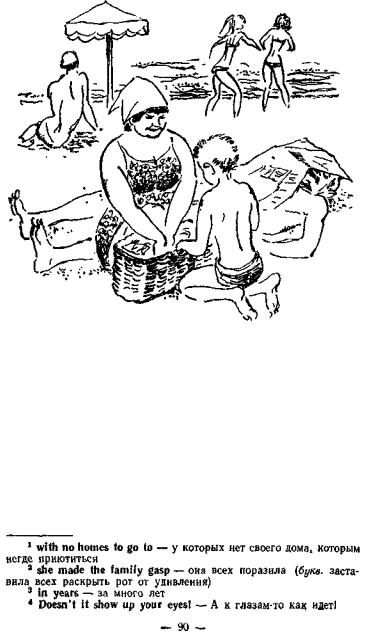
days of sun and air. He ate enormous meals and stopped worrying about stray dogs or poor crabs with no homes to go to.1
But the person who changed most was Auntie Glad. The first morning, she made the family gasp,2 for she came to breakfast in a new, blue-striped cotton dress, with her hair tied up in a blue scarf. For the first time in years,3 the family really looked at her. In the flat, wearing her
dark |
coat and her cap pulled down to her ears, |
she had |
|
been |
just a person that nobody ever noticed. |
|
|
"Oh, Glad!" cried Mum in surprise. "Why, you look |
|||
smashing! |
Where did you get that pretty dress? |
Doesn't |
|
it show up |
your eyes!" 4 |
|
|
